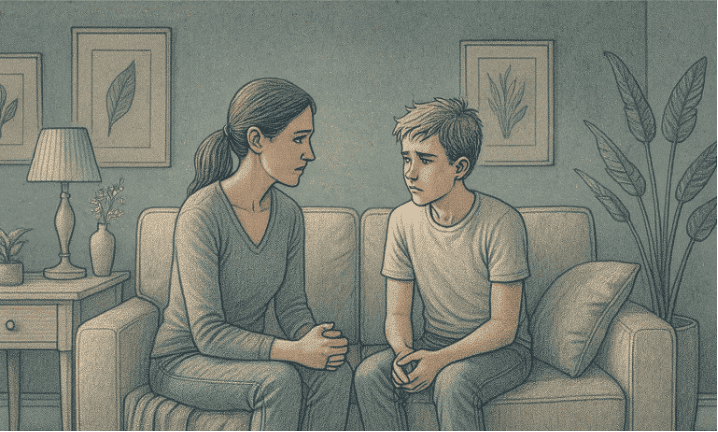Key Takeaways
- Asking directly about suicide shows your teen you’re not afraid of the conversation, opening the door for honesty and support instead of silence.
- Listening without judgment and validating their pain helps your teen feel understood, reducing feelings of isolation and shame.
- Recognizing warning signs, like withdrawal, mood swings, or talk of hopelessness, allows parents to act quickly before the situation worsens.
- Getting professional help right away is essential, ensuring your teen receives evidence-based care and a safety plan for long-term recovery.
- Mission Prep offers specialized crisis intervention and ongoing support for teens ages 12–17 experiencing suicidal thoughts through residential, outpatient, and telehealth programs that involve families in the healing process.
Understanding Teen Suicidal Thoughts
When your teen expresses thoughts of suicide, it can feel overwhelming and terrifying. You might wonder if you missed warning signs or feel unsure about how to help. These reactions are natural, but the most important thing to know is this: you can make a difference right now.
Suicidal thoughts in teens are often a response to feeling overwhelmed by problems that seem insurmountable. Depression, anxiety, relationship difficulties, academic pressure, bullying, or family conflict can create feelings of hopelessness. For some teens, suicidal thoughts become a way of imagining escape from emotional pain they don’t know how to manage.
Parents play a critical role in suicide prevention. Your willingness to have difficult conversations, recognize warning signs, and seek professional help can save your teen’s life. While this topic feels frightening to address, avoiding it doesn’t protect your teen; engagement does.
Mission Prep Healthcare specializes in mental health treatment for teens aged 12-17, offering residential and outpatient programs for anxiety, depression, trauma, and mood disorders. Our therapies include CBT, DBT, EMDR, and TMS, tailored to each adolescent’s needs.
With a structured, supportive environment, we integrate academic support and family involvement to promote lasting recovery. Our goal is to help teens build resilience and regain confidence in their future.
Tip 1: Ask Directly About Suicidal Thoughts

Asking directly about suicide opens the door for teens to share their struggles and signals that you can handle difficult conversations.
One of the most important things you can do is ask your teen directly if they’re thinking about suicide. Many parents worry that bringing up suicide might plant the idea in their teens’ heads, but research consistently shows this fear is unfounded. Asking about suicidal thoughts does not increase risk or create ideas that weren’t already there.
What asking does accomplish is crucial: it tells your teen that you’re strong enough to handle their darkest thoughts, that they don’t have to face these feelings alone, and that help is available.
Choose a private moment when you won’t be interrupted. If you’ve noticed warning signs or your teen has expressed distress, you might say: “You’ve been going through a really difficult time lately. I’m concerned about you. Have you been having thoughts about ending your life?”
Use the word “suicide” directly. Euphemisms like “doing something to hurt yourself” can be confusing and suggest the topic is too scary to name clearly.
If your teen says yes, stay calm. Thank them for trusting you with this information. Your reaction in this moment matters enormously; panic or anger can shut down communication when your teen most needs to talk.
Tip 2: Listen Without Judgment
When your teen opens up, the most important thing you can do is listen; truly listen, without rushing to fix, dismiss, or explain away their feelings. Phrases like “You have so much to live for” or “You’re being dramatic” may come from care, but they often make teens feel misunderstood.
Instead, focus on validating what they’re going through. Saying things like “That sounds incredibly painful” or “Thank you for telling me, I know this isn’t easy” shows you take their feelings seriously. Validation doesn’t mean you agree suicide is the answer—it simply acknowledges that their pain is real.
Give space for them to share more. Ask open-ended questions, and don’t be afraid of silence. Sometimes, the quiet gives them room to find their words. If they mention specific struggles, acknowledge them without minimizing. What feels small to you can feel overwhelming to them, and that perspective matters.
Keep the focus on understanding, not solutions. There will be time to problem-solve with professional help. For now, your teen needs to know they’re heard.
Tip 3: Recognize Warning Signs
Some teens openly talk about suicidal thoughts, while others show their pain through changes in behavior. Knowing the warning signs can help you recognize when something deeper is going on, even if your teen hasn’t said it outright.
Red flags that need immediate attention include talking about dying, looking up ways to end their life, giving away meaningful possessions, saying goodbye to people, pulling away from everyone, or feeling like a burden.
Other shifts to watch for are sudden mood swings, irritability, aggression, sleeping too much or too little, slipping grades, losing interest in things they once loved, risky behavior, or talking about feeling hopeless or trapped. Sometimes emotional distress shows up in physical ways, like unexplained headaches, stomachaches, or constant fatigue.
It’s normal for teens to have mood swings, but what’s concerning is when changes linger for weeks, several warning signs appear at once, or your teen starts acting completely out of character. Trust your gut; if something feels off, take it seriously and don’t wait for things to fix themselves.
Tip 4: Get Professional Help Immediately

Professional mental health support is essential when teens express suicidal thoughts, providing evidence-based treatment and safety planning.
When a teen talks about suicide, professional help is essential. Even if they seem better, they still need evaluation and ongoing support.
If there’s immediate danger, like a plan, access, and intent, call 911 or go to the nearest ER for a psychiatric evaluation. If it’s not an emergency, but suicidal thoughts are present, contact their doctor for a quick referral. Many therapists make time for teens in crisis.
Effective treatments include cognitive-behavioral therapy, dialectical behavior therapy, and family therapy, each teaching skills that target the challenges behind suicidal thoughts. Therapists also work with teens to create a safety plan: clear steps for coping, reaching out, and staying safe when thoughts become overwhelming.
Keep appointments even if your teen resists. Suicidal thoughts can fluctuate, and steady professional care helps them build long-term resilience.
🆘 CRISIS RESOURCES
If your teen is in immediate danger, call 911.
988 Suicide & Crisis Lifeline: Call or text 988 (available 24/7)
Crisis Text Line: Text HOME to 741741
How Mission Prep Supports Teens in Crisis

Mission Prep provides comprehensive crisis intervention and ongoing treatment for teens experiencing suicidal thoughts through specialized therapeutic programs.
When teens experience suicidal thoughts, Mission Prep Healthcare offers specialized programs designed specifically to help adolescents ages 12–17 find safety, hope, and healing.
Our crisis intervention services provide immediate support when teens are in acute distress. Through residential, outpatient, and telehealth options, we offer the appropriate level of care based on each teen’s individual needs and safety concerns.
Our clinical team specializes in evidence-based therapies proven effective for teens with suicidal thoughts. Cognitive-behavioral therapy helps teens identify and change thought patterns contributing to hopelessness, while dialectical behavior therapy teaches critical skills for managing intense emotions, tolerating distress, and improving relationships.
We recognize that teen suicidal thoughts rarely exist in isolation. Our comprehensive approach addresses underlying issues like depression, anxiety, trauma, or family conflict that contribute to suicidal thinking.
Family involvement is central to our treatment philosophy. We provide family therapy to improve communication, reduce conflict, and help parents understand how to best support their teen. Parents learn practical strategies for recognizing warning signs, responding to crises, and creating a supportive home environment.
Our programs emphasize safety planning and skill development. Teens learn concrete techniques for managing suicidal thoughts when they arise, develop healthy coping strategies, and build reasons for living that carry them through difficult moments.
Frequently Asked Questions (FAQ)
My teen told me they’ve had suicidal thoughts but made me promise not to tell anyone. What should I do?
You cannot keep suicidal thoughts confidential—your teen’s safety must come first. Explain to your teen that you love them too much to keep this secret, and that getting help is the most important thing right now. You might say, “I understand you wanted this to stay between us, but when someone’s life might be in danger, I have to get help. I’m not doing this to betray you—I’m doing this because I love you and want you to be safe.” Most teens, despite initial anger or disappointment, ultimately feel relieved that adults are taking their thoughts seriously and getting them help.
How do I know if my teen’s suicidal thoughts are serious or just a phase?
All expressions of suicidal thoughts should be taken seriously, regardless of whether you think they’re a “phase.” You cannot predict which teens will attempt suicide based on whether their thoughts seem serious to you. Even teens who aren’t currently planning suicide but are thinking about it need professional evaluation and support. The only appropriate response to learning about suicidal thoughts is seeking professional help; let mental health professionals determine the level of risk and appropriate intervention.
What should I do if my teen refuses to get help?
If your teen refuses help but isn’t in immediate danger, explain that you understand they don’t want to go but that you’re responsible for keeping them safe. Offer choices when possible: “Would you prefer to see a therapist in person or through video calls?” or “Would you feel more comfortable talking to a male or female therapist?” If your teen absolutely refuses and is in crisis, you may need to take them to the emergency room despite their objections. In non-crisis situations, you can attend therapy sessions yourself to get guidance on how to help your teen agree to treatment.
How does Mission Prep help parents whose teens are experiencing suicidal thoughts?
Mission Prep provides immediate crisis assessment when parents are concerned about their teen’s safety, determining the appropriate level of care needed. We offer parent education and support throughout treatment, teaching families how to recognize warning signs, respond to crises, and communicate effectively with their teen. Our family therapy component helps address relationship dynamics and gives parents practical tools for creating a safe, supportive home environment. We maintain open communication with parents throughout treatment while respecting teen privacy appropriately, ensuring families feel informed and empowered to support their teen’s recovery.















